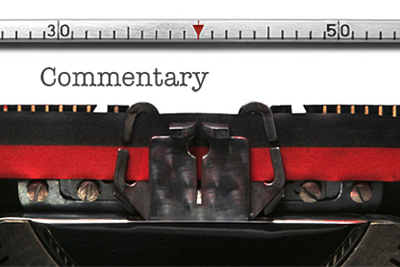Commentary is a regular UMSL Daily column written by members of the UMSL community.
Recently I received an email from a student unlike any message I have received in 40 years as a college professor. It is worth noting for what it says not so much about this student as about the culture we have now created within K-16 education in America. Commenting on the failing grade the student received in one of my courses, the individual wrote that s/he had “complied” with the paper and tests and that it was I, the instructor, who had failed insofar as I had not done what it took to enable a passing grade and had not given adequate warning of failure. The student concluded that “you should be embarrassed to give a student an F” and demanded a refund of the money charged for the course.
Never mind the fact that the student did not even bother to purchase the required textbook for the course much less read it, or that s/he came to class only sporadically, or that s/he had received an F on the midterm exam (which normally constitutes a “warning” that you may be at risk of failing and which, in combination with the F s/he received on the final exam and a D on the term paper, normally computes to an F grade); under the “new math,” a slate of poor grades during the semester (“formative assessments”) can be instantly wiped clean and the course grade (“summative assessment”) inflated simply by offering redos and/or extra credit, unless a teacher is as heartless as I seem to be.
And never mind the fact that I even went so far as to copy chapters in the book for the student when s/he claimed s/he could not afford the book, and gave this person (along with the entire class) an elaborate study guide prior to each exam indicating the questions on the tests. I also appended to the course syllabus a “Writing Caution” about dotting i’s, crossing t’s, making sure the paper was proofread before prof-read, and other common-sense tips. But where this student is coming from, evidently, it is no longer sufficient to hold a student by the hand. You must now literally hand the student a diploma.
Starting in K-12, and now extending into higher education, we have been cultivating a mindset where the F-word (“failure”) is no longer permissible, even when a student exerts almost zero effort. It begins in the early grades, where during the last several decades academic standards have collapsed to the point that kids receive gold stars or trophies for nonexistent (or trivial) achievement and are advanced to the next grade if they have a pulse. There is a well-intentioned effort to help struggling learners especially, since in the past they were often overlooked by schools, but in the process all learners are reduced to the lowest common denominator.
Many contemporary school administrators instruct their staff that “failure is not an option.” If you are a teacher who is told that, if you issue a failing grade, the fault lies with you and not the student, what are you to do, especially when such well-known professional development gurus as Robert Marzano and Rick Dufour are constantly cited in the latest education “research” and have been hired by principals to reinforce this message? (For example, Marzano, who puts the onus entirely on the teacher rather than the student or parent and who believes the right kind of “assessment-intervention” regimen can allow “all” students to “succeed,” is the featured speaker at an upcoming school administrators conference sponsored by the Missouri Department of Elementary and Secondary Education).
This model of education is now being transferred to the university level, as professors see many of the products of such K-12 training on college campuses in need of “support” (aka remediation), not only lacking basic academic skills and knowledge but the most rudimentary understanding of what it takes to become an “educated” person. Thus, on my campus and many others, “retention” centers are proliferating along with “early alert” warning systems designed to help students by sending them regular reminders to come to class, turn in work by the due dates and perform other basic obligations that can be gleaned if they simply read the syllabus. Thus, the “coddling” paradigm has been imported from K-12 into academia as we treat adults like children (while of course overlooking or excusing potentially harmful behaviors on grounds that these are adults and the college must not act in loco parentis). Many professors are trying to resist the decline in expectations – indeed, despite grade inflation there is still a high college dropout rate – but the combination of “equity” pressures along with cash-strapped colleges wanting to retain tuition-paying students is creating the perfect storm likely to lead to further erosion of standards.
Both left and right are to blame. On the left, there are those who push the “therapeutic model” – the idea that the student is a “patient” whose problems a school is supposed to fix and who is entitled to endless chances to mess up, redo work, and graduate to the next level in the name of “access” and “fairness.” On the right, there are those who push the “business model” – the idea that the student is a “customer” who is entitled to a school’s best customer-is-always-right “services” in the name of “market-style accountability.” President Obama wants to see “college readiness for all,” and many Republican state legislators want to see “higher graduation rates.” Between them, I am getting ready for more emails telling me what a lousy teacher I am.
J. Martin Rochester is a Curators’ Teaching Professor of Political Science at the University of Missouri–St. Louis. A version of this column first appeared on the website Education Gadfly Weekly.















